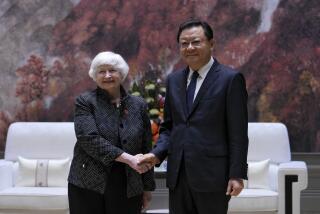Clinton aims to make her mark in China
When Hillary Rodham Clinton needed a way to restore her reputation after the failure of her 1990s healthcare initiative, China provided the opportunity.
As first lady, Clinton delivered a fiery speech on human rights at a women’s conference in Beijing in 1995, winning a worldwide following while dismaying her Chinese hosts, who banned coverage in the country’s official media.
Now, as President Obama’s secretary of State, Clinton is again looking for a way to make a mark, and once more China beckons.
The circumstances have changed in 14 years. But as she prepares to head to China this week as part of her first overseas trip in her new role, Clinton is making a behind-the-scenes bid for control of U.S. policies on China, said people familiar with the private conversations who described them on condition of anonymity.
In a series of high-level administration discussions to press her case, Clinton has contended that the complex issues related to China should fall under the nation’s top diplomat, not economic officials, who controlled them during the Bush years, or others, the people familiar with the conversations said.
In her overture to the East, Clinton may have decided that the U.S.-China relationship offers a special opportunity to build a lasting diplomatic record, said Asia specialists inside and outside the government.
An emphasis on China “makes a lot of sense,” said Drew Thompson, an analyst at the Nixon Center. “She could create a legacy there.”
Looking across the diplomatic landscape, China has more of an upside than the seemingly intractable foreign policy problems elsewhere -- Iran, North Korea, the Middle East. In those regions, the administration is assigning “super envoys” to tackle thorny problems.
The Bush administration generally has been given high marks for its handling of China. But Clinton said recently that during the Bush years, the relationship became “an economic dialogue.”
“That’s a very important aspect of our relationship with China,” she said. “But it is not the only one.”
Clinton’s more comprehensive approach, however, will require the Obama administration to air issues that the Bush team generally soft-pedaled in the interest of harmony.
Clinton wants a new focus on issues such as climate change, energy, human rights and China’s repression of Tibet. She wants to engage with the Chinese on difficult economic issues, including currency values, a sore subject after Treasury Secretary Timothy F. Geithner accused China during his confirmation hearing last month of manipulating its currency.
She is seeking to forge a new U.S.-Chinese agreement on climate change at a moment when the Chinese fear that any threat to the economy could jeopardize social stability. Clinton is bringing the administration’s new climate change envoy, Todd Stern, on the trip to show her seriousness.
But on the question that defined her early involvement in China, Clinton plans to raise the difficult subject of human rights only in passing, if at all, on this trip, officials said. Nonetheless, they said, she considers it a top concern.
In her 1995 speech, Clinton accused China of curtailing women’s rights, including through its one-child policy. Last spring, after China’s crackdown on Tibetan protesters, she urged President Bush to boycott the opening ceremony of the 2008 Beijing Olympics.
She has also been tough on Chinese leaders on economic issues, complaining about their trade and currency practices. She said China’s huge holdings of U.S. Treasury bonds were causing “a slow erosion of our own economic sovereignty.”
Beijing is well aware of Clinton’s record, but Chinese analysts said leaders were pleased with her decision to make Asia her first stop as secretary of State. They hope that what they see as a positive relationship through the Bush years can continue, analysts said.
Chu Shulong, director of the Institute of Strategic Studies at Qinghua University in Beijing, said Chinese anxiety about Clinton after her 1995 address eased after a 1998 trip in which she accompanied President Clinton on a state visit.
“The Chinese leadership, including [then-President] Jiang Zemin, got along very well with her,” Chu said.
Clinton’s campaign statements are unlikely to affect the leadership’s view of her, said Jin Canrong, deputy director of People’s University’s Center for American Studies in Beijing.
“I think people fully understand the gap between campaign rhetoric and the real policy of the new officeholders,” Jin said.
Still, Beijing’s relationship with the Obama administration has had a rocky beginning.
The first policy position articulated by the new administration was Geithner’s charge of Chinese currency manipulation.
On top of that, Chu said, moves by Congress to include potentially restrictive “Buy American” provisions in the recently passed economic stimulus package have raised concerns in China -- as in other countries -- that the United States may be moving toward protectionism.
For Clinton, there are risks to pushing contentious issues. The Chinese could downgrade the dialogue, so that her conversations are not with a vice premier but with a lower-ranking official who has far less leverage, said the Nixon Center’s Thompson.
But the Chinese could be urged to play a larger role in world affairs, as Washington believes befits their size, he said.
Although China historically has limited its involvement overseas, it has begun edging in a new direction. Under Western pressure, it has used its leverage with the Sudanese government to try to ease the Darfur crisis and, in a move that surprised State Department officials, mobilized its navy last year to fight piracy near Somalia.
If Clinton succeeds in encouraging more such involvement, Thompson said, “that could be her big contribution.”
--
peter.spiegel@latimes.com
More to Read
Start your day right
Sign up for Essential California for news, features and recommendations from the L.A. Times and beyond in your inbox six days a week.
You may occasionally receive promotional content from the Los Angeles Times.






